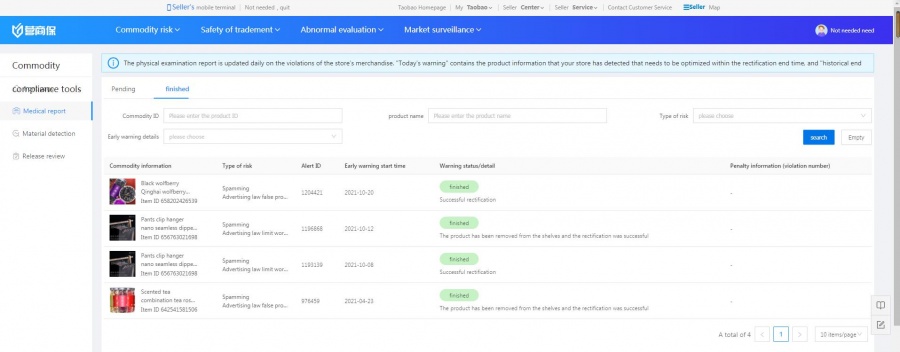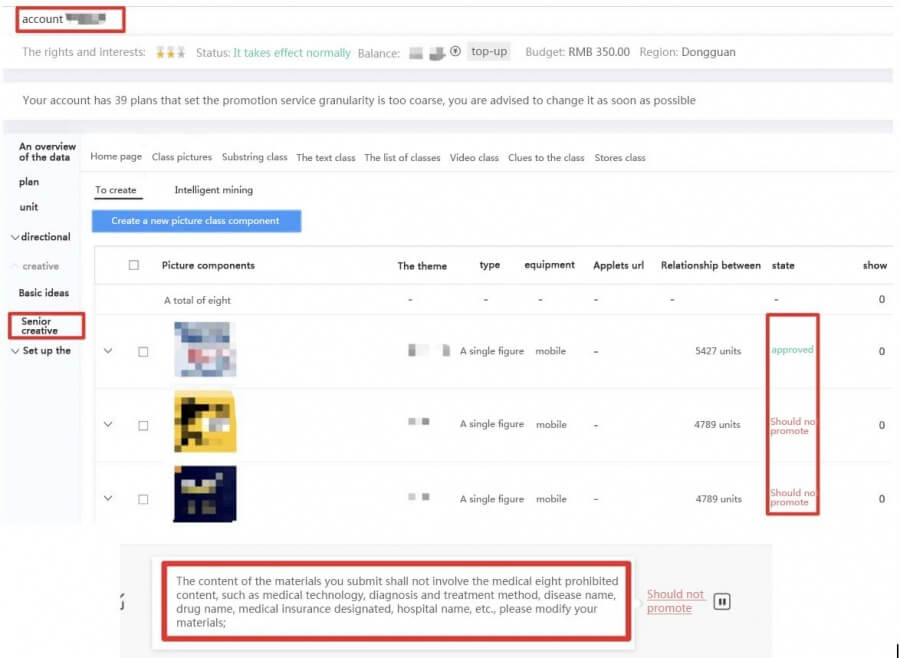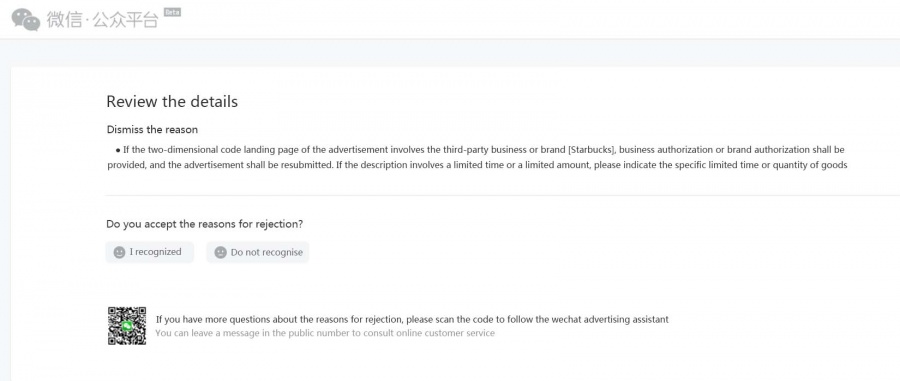Foreign e-commerce companies face different regulations for online promotion outside China. There are many specific restrictions regarding online Marketing in China, as the promulgation of the latest advertisement law and intellectual property rights protection law requires any advertisement to be summited to review a second time even if passed the review by media network. Since it is hard to avoid ads violations, several brands were punished by the local authorities.
When foreign brands promote in China, the most common problems are: (1) copy writing, (2) Trademark issues and (3) unauthorized font use.
Copywriting issues
In order to comply with the latest advertising regulations, any abuse regarding its written content may be under review, therefore overexaggerated product information, misleading content, the use of banned words and so on.
Here are some common forbidden words for copywriting:
1, Including “First/home/country” and related words
First, first choice, global debut, exclusive, national sales champion, national product, national leader and other terms.
- Include “most” and related words
Best, largest, superlative, most extravagant, least expensive, most popular, etc. all terms with the same or similar meanings.
Case Study:
Canadian brand Canada Goose, (Canada Goose Xi Ji Shanghai Trading Co., Ltd). was fined 450,000 yuan for Posting the text that “all of our down blending materials contain Hutterite down, which is the best and warmest Canadian down”. The content of advertising contains the words “warmest”, which will have a material impact on consumers’ purchasing behavior and constitute false advertising.
- Related words that contain “one”
No.1 in China, no.1 in sales, no.1 in ranking, only, no.1 brand, No.1, TOP.
- Include “absolutely” related words
Absolute, big brand, accurate, leading listed, famous, excellent, unique, unprecedented, universal, 100%, pure natural, international quality, high-grade, genuine, global, world class, top, best, excellent, ultimate, extreme and other exaggerated expressions which cannot be proven truth or false.
- Words related to brand status
Trump card, leader brand, world leading, far ahead, leader, founder, leading listing, king, champion and other terms.
- Suspected fraudulent consumer expression
Click to claim the prize, national free order, click to get, click to try on, non-GM is safer and other statements suspected of inducing consumers.
- Stimulate the consumer to buy psychological expression
Last in Stock, sold out, the lowest price in history, people top choice, free to get the words to stimulate the buying psychology.
- determiner expression
Limited, limited time, limited purchase, countdown, weekend, anniversary, just this once, price cut now, etc.
Case Study:
H&M, a Swedish brand, used the word “China limited”. Due to good sales, the headquarters allocated the product to the Asian market, but the online page of its Chinese branch (Haynes Morris (Shanghai) Commercial Co., LTD.), was not updated and forgot to remove the “China limited”. Being reported false publicity, fines of about 260,000 yuan. This is not the first time H&M has been fined. It has been fined six times, and the total amount of administrative fines has reached 890,000 yuan in total.
- Common goods contain suspected medical terms
Overall adjustment of human endocrine balance, enhance or improve immunity, sleep aid, insomnia, anti-inflammatory, can promote metabolism, anti-inflammatory, weight loss, treatment, sterilization, disinfection and other related medical terms.
Rejected cases by Baidu promotion audit:
Case Study:
French brand Chanel, (Chanel (China) trade co., LTD). advertised its “Chanel costly essence cream (light)” and “Chanel luster night repair mask” stating in an ad that it “inhibit melanin” and make “spots fade” linking it to whitening efficacy. Since these two cosmetics obtained the “import non-special use cosmetics filing certificate”, and “the products are non-special use cosmetics”, Chanel was fined based in false advertising allegations, and was fined in 200,000 yuan.
DHC, a Japanese brand, was fined 350,000 yuan for “publishing false advertisements in violation of relevant provisions of the advertising law”. Before this, Shanghai Diecuishi Commercial Co., Ltd. has been punished twice by the regulatory authorities for publishing false advertisements involving the treatment of diseases and the “best” terms, totaling nearly one million yuan.
The Japanese brand Yakult (Shanghai Yakult Dairy Co., LTD.) advertised “probiotics play an important role in the prevention and treatment of Novel Coronavirus Pneumonia” in China, connecting this statement with China’s Diagnosis and Treatment protocol of Novel Coronavirus Pneumonia, which is very likely to increase consumers’ attention and trust in its lactobacillus products. The mistaken belief that probiotics have a protective effect on novel coronavirus; “Good bacteria in the gut are lost with normal excretion, so it is necessary to supplement with live probiotics every day to maintain the balance of bacteria in the gut.” , can lead people to believe that not taking probiotics every day will have adverse effects on their health, therefore Yakult was fined 450,000 yuan.
Trademark issues
According to the Trademark Law of China, the registrant shall enjoy exclusive use of the trademark and it must be protected by the law. If it is a well-known trademark, the registrant will be granted cross-category legal protection. In China, the license for trademark use can be divided into three types: general license, exclusive license and exclusive license for trademark use. Those licenses have great differences in nature. “A trademark registrant may authorize others to use its trademark by signing a trademark licensing contract.” where the licensor authorizes another person to use its registered trademark, it shall, within 3 months from the date of signing the trademark licensing contract, submit a copy of the contract to the Trademark Office for the record. Therefore, if you want to use the trademark, you must license it and put on record in the Trademark Office before using it, otherwise it will be considered a trademark infringement.
Rejected cases of Wechat public Account advertisement review:
Case Studies:
China’s Guangzhou Willy Daily Chemical Co., Ltd. was fined 240,000 yuan for infringing exclusive rights in trademark registration by selling products under brands such as “Blue Moon”, “Libai” and “High R&F”. According to the Trademark Law, without the permission of the trademark registrant, by using the same or similar trademark on the same or similar goods will constitute infringement of the exclusive trademark right. However, Willy Daily Chemical did not obtain any trademark authorization and purchased products from unknown channels, therefore it could not provide legal purchase bills to explain the source, causing trademark infringement.
A jewelry store in Haikou, China, sold necklaces that violated the “Bulgari” trademark, and could not provide an official receipt, failing to explain the legal source of the goods. Haikou Market Supervision Administration imposed a fine of 18,000 yuan to the brand.
In order to avoid trademark infringement, it is suggested that foreign retail trading companies try their best to obtain a trademark authorization, and provide formal documents to prove that the products are not counterfeit.
Font problem
According to the provisions of China’s copyright law, font design is a type of writing works and is protected by China’s copyright law. However, Chinese e-commerce has become the main spot for font infringement. Many Brands are not aware of font copyright, and often download fonts from third-party software websites to use, only to know the infringement after receiving the lawyer’s letter. When using fonts for promotion and publicity in China, attention should be paid to the rights over font use, so as to avoid being sued by the other party and bringing unnecessary trouble.
Case Study:
On its e-commerce platform, a tourism flagship store once received an infringement notice from Beijing Peking University Founder Electronics Co., LTD., pointing out that the 9 fonts in the store’s app, including Founder Cartoon Simplified, Founder Lanting Bold simplified, Founder Huangcao simplified and so on, were not authorized to be used, which is an infringement. Eventually the brand chose to pay for the rights.
Another retail trading company used a font from Huakang on its online store and on its products’ packing. Later, it received a “negotiation letter” from Huakang Information Technology Company, saying that the chosen font infringed the copyright and it needed to pay more than 10,000 yuan in copyright fees.
Conclusion
Any foreign brand which wants to enter the Chinese ecommerce market need to understand and comply to the local advertising regulations. China’s online marketing ecosystem is very different from other countries, therefore its content strategy is unique. Illegal advertising operations are easily reported, which will affect the brand’s image in China. Therefore, foreign brands tend to employ local agencies in order to successfully advertise in China, without breaking any local regulation.



